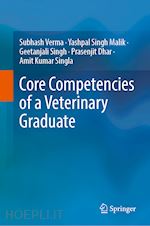
Questo prodotto usufruisce delle SPEDIZIONI GRATIS
selezionando l'opzione Corriere Veloce in fase di ordine.
Pagabile anche con Carta della cultura giovani e del merito, 18App Bonus Cultura e Carta del Docente
This book is an essential guide for veterinarians, veterinary faculty and policymakers for understanding the core competencies of a fresh veterinarian. The book briefly covers competencies in preclinical, paraclinical, and clinical subjects including anatomy, physiology, biochemistry, veterinary jurisprudence, animal management & welfare including nutrition and breeding, infectious and non-infectious diseases, disease epidemiology, diagnosis, and treatment, prevention, control and zoonoses, surgical and other clinical interventions. The book further includes other competencies, including biologicals, anti-mortem, and post-mortem inspection, certifications, applied one health aspects, review and analysis of scientific evidence, international trade and regulations, and organization of veterinary services. It also highlights the importance of effective communication, interpersonal skills, record keeping and management of a small veterinary hospital, health informatics, etc. The book breakdowns the must-have competencies of a global veterinarian into different topics and subtopics for easy comprehension and further learning. It enables the professional standard-setting & regulatory bodies and academicians in improved curricula designing and implementation and more importantly tries to bring uniformity in day one veterinary graduates’ competencies globally, enhancing the movement and employability of veterinarians across the world.
Dr. Subhash Verma has an extensive 25-year career in various professional capacities. Currently positioned as a professor of veterinary microbiology and heading both the veterinary parasitology department and the veterinary emergency response unit-north zone at the Veterinary College in Palampur, Himachal Pradesh, India, he also serves as an associate editor for an international journal. Formerly, he led the fisheries department for approximately five years at Chaudhary Sarwan Kumar (CSK) Himachal Pradesh Agricultural University. After completing his undergraduate veterinary degree, Dr. Verma pursued a master's in veterinary microbiology, followed by a second master's in immunopharmacology with distinction at the University of Strathclyde, Glasgow, under a British Chevening Scholarship. He obtained an Overseas Research Scholarship for a Ph.D. in Immunogenetics from the University of Glasgow and conducted a Postdoctoral Fellowship at the Wellcome Centre of Molecular Parasitology, Glasgow. Recognized as a Fellow of the National Academy of Veterinary Sciences, India, Dr. Verma has significantly contributed to scientific research. His achievements include deciphering cattle antibody diversity mechanisms, pioneering the functional assessment and mapping of cattle activation-induced cytidine deaminase, characterizing virulent determinants, and developing an indirect ELISA for P. multocida. He also played a key role in creating and characterizing the AprV2 nanovaccine against Footrot. His research output comprises numerous high-quality papers, books, book chapters, manuals, sequences and microbes submitted to international and national repositories.
Prof. Yashpal Singh Malik is serving as the Dean of the College of Animal Biotechnology, Guru Angad Dev Veterinary and Animal Sciences University, Ludhiana, India. He is a recipient of the prestigious position “ICAR National Fellow” at the ICAR-Indian Veterinary Research Institute. His areasof expertise are rotaviral diseases, viral disease epidemiology, microbial biodiversity, host-virus interactions, and pathogen-diagnostics. He has pursued advanced studies in molecular virology at the University of Minnesota, USA; University of Ottawa, Ontario, Canada; and Wuhan Institute of Virology, Wuhan, China. Prof. Malik is serving as the chair picobirnavirus family at the World Health Organization. He is the recipient of several prestigious national, state and academy awards and honours, including the ICAR-Jawaharlal Nehru Award. He has authored several books and book chapters, and various research and review articles. Prof. Malik has been associated with societies of international repute, like, the Secretary General of the World Society for Virology, Federation of Asian Veterinary Association, World Veterinary Association, International Committee for Taxonomy of Viruses and at national level serving as Secretary General of Indian Virological Society. Prof. Malik is the series editor for Springer's "Livestock Disease Management" book series. He is the Editor-in-Chief of various journals. He has been awarded a prestigious Fellowship by the Academy of Microbiological Sciences, National Academy of Veterinary Sciences and National Academy of Dairy Sciences.
Dr. Geetanjali Singh is professor and head in the Department of Veterinary Physiology and Biochemistry, Dr GC Negi College of Veterinary and Animal Sciences, CSK Himachal Pradesh Agricultural University, Palampur, India. She has earlier served as an assistant professor of animal nutrition & a veterinary officer in the government sector. She was a visiting associate professor at University of Queensland, Brisbane, Australia and eco development specialist in Indo German Eco Development project run by Indian and German Governments in lower Himalayan region of India. After graduating as a vet and specializing in animal nutrition she pursued her Masters in Applied Biomolecular Technology from University of Nottingham, UK and PhD in Medical Biochemistry and Molecular Biology from University of Glasgow, UK. Her research interests include early biomarker of diseases & biochemical and molecular characterization of native animal breeds. She has been conferred with various prestigious awards notably, Commonwealth Award by the Department for International Development, United Kingdom, Wellcome Trust Value in People Award, Rapid Grant for Young Investigator by Department of Biotechnology India and Woman Scientist Award by Indian Society for Veterinary Immunology and Biotechnology etc. She is on the panel of mentors of commonwealth students and has worked as principal investigator and co-principal investigator in many research projects. She has more than 20 years of teaching experience in the field of Veterinary Biochemistry and Animal Nutrition. She has published in the peer-reviewed journals and co-authored books and book chapters.
Dr. Prasenjit Dhar











Il sito utilizza cookie ed altri strumenti di tracciamento che raccolgono informazioni dal dispositivo dell’utente. Oltre ai cookie tecnici ed analitici aggregati, strettamente necessari per il funzionamento di questo sito web, previo consenso dell’utente possono essere installati cookie di profilazione e marketing e cookie dei social media. Cliccando su “Accetto tutti i cookie” saranno attivate tutte le categorie di cookie. Per accettare solo deterninate categorie di cookie, cliccare invece su “Impostazioni cookie”. Chiudendo il banner o continuando a navigare saranno installati solo cookie tecnici. Per maggiori dettagli, consultare la Cookie Policy.